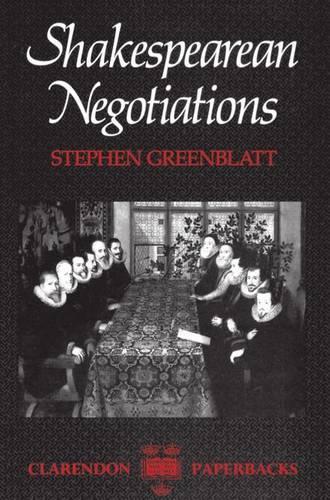Full Product Details
Author: Stephen Greenblatt (The Class of 1932 Professor of English Literature, The Class of 1932 Professor of English Literature, the University of California, Berkeley)
Publisher: Oxford University Press
Imprint: Clarendon Press
Edition: New edition
Dimensions:
Width: 13.70cm
, Height: 1.20cm
, Length: 21.60cm
Weight: 0.314kg
ISBN: 9780198122272
ISBN 10: 0198122276
Pages: 216
Publication Date: 12 April 1990
Audience:
Professional and scholarly
,
Professional & Vocational
Format: Paperback
Publisher's Status: Active
Availability: To order

Stock availability from the supplier is unknown. We will order it for you and ship this item to you once it is received by us.
Reviews
`the most powerful and persuasive vision of the place of literature in Renaissance society in this generation ... a stunning volume, in which he moves beyond his earlier work to consider its assumptions and reassess the implications of its argument, and to provide thereby a poetics of Renaissance culture. The book is strong, supple, wide-ranging, and incredibly learned; to watch Greenblatt's mind in action in it is one of the greatest pleasures contemporary scholarship affords us.' Stephen Orgel `Greenblatt compels one to think afresh about the strange position of a theater existing on the margin of an authoritarian society, and indeed about the whole question of the social and political contexts of works of art.' Frank Kermode, New Republic `so sharp on cultural stereotypes and on the abuse of power, should be read by all students of history and literature, by all thinking men and women' New York Review of Books 'he dazzlingly exploits unexpected parallels and exchanges between Elizabethan medical theory andHenry IV ...a fascinating and provocative book. It deserves to be read.' Country Life 'The cumulative effect of reading these four essays is one of exhilaration. The precise, enriching scholarship of our best historians of the people ... has been brought across in Greenblatt's writing into Shakespeare Studies.' Martin Elliott, The English Association 'this is a fascinating and provocative book ... It deserves to be read.' Paul Hartle, Country Life 'the movingly personal introduction conveys a love of Shakespeare that implies an untheoretical closeness to a man as well as a text ... Greenblatt is, of course, a wonderfully skilled story teller. Dorothy Porter, University of Glasgow. Theatre Research International 'the imaginative urgency of Greenblatt's criticism ... absorbing book' Graham Bradshaw, English Studies 'elegant, urbane, and learned monograph' Graham Holderness, Roehampton Institute, Modern Language Review 'As a book of critical insights into some of Shakespeare's plays ... it abounds with stimulating comment and is written in Greenblatt's fluent and engaging prose style' Thomas Healy, Birkbeck College, London, Renaissance Studies 'intricate and densely argued book ... its patient and scholarly uncovering of the complexities, and the contradictions, of the operations of power contributes excitingly to the study of Shakespearian texts' John Drakakis, University of Stirling, Notes and Queries `If his self-explanatory model is (for all its suppleness) continually defeated by the richness of the literary material, then the very defeat is vivid to us because of the honest intelligence and sensitivity of Greenblatt himself. This is remarkable writing; we need more of the same.' Comparative Criticism
'the most powerful and persuasive vision of the place of literature in Renaissance society in this generation ... a stunning volume, in which he moves beyond his earlier work to consider its assumptions and reassess the implications of its argument, and to provide thereby a poetics of Renaissance culture. The book is strong, supple, wide-ranging, and incredibly learned; to watch Greenblatt's mind in action in it is one of the greatest pleasures contemporary scholarship affords us.' Stephen Orgel 'Greenblatt compels one to think afresh about the strange position of a theater existing on the margin of an authoritarian society, and indeed about the whole question of the social and political contexts of works of art.' Frank Kermode, New Republic 'so sharp on cultural stereotypes and on the abuse of power, should be read by all students of history and literature, by all thinking men and women' New York Review of Books 'he dazzlingly exploits unexpected parallels and exchanges between Elizabethan medical theory andHenry IV ...a fascinating and provocative book. It deserves to be read.' Country Life 'The cumulative effect of reading these four essays is one of exhilaration. The precise, enriching scholarship of our best historians of the people ... has been brought across in Greenblatt's writing into Shakespeare Studies.' Martin Elliott, The English Association 'this is a fascinating and provocative book ... It deserves to be read.' Paul Hartle, Country Life 'the movingly personal introduction conveys a love of Shakespeare that implies an untheoretical closeness to a man as well as a text ... Greenblatt is, of course, a wonderfully skilled story teller. Dorothy Porter, University of Glasgow. Theatre Research International 'the imaginative urgency of Greenblatt's criticism ... absorbing book' Graham Bradshaw, English Studies 'elegant, urbane, and learned monograph' Graham Holderness, Roehampton Institute, Modern Language Review 'As a book of critical insights into some of Shakespeare's plays ... it abounds with stimulating comment and is written in Greenblatt's fluent and engaging prose style' Thomas Healy, Birkbeck College, London, Renaissance Studies 'intricate and densely argued book ... its patient and scholarly uncovering of the complexities, and the contradictions, of the operations of power contributes excitingly to the study of Shakespearian texts' John Drakakis, University of Stirling, Notes and Queries 'If his self-explanatory model is (for all its suppleness) continually defeated by the richness of the literary material, then the very defeat is vivid to us because of the honest intelligence and sensitivity of Greenblatt himself. This is remarkable writing; we need more of the same.' Comparative Criticism




